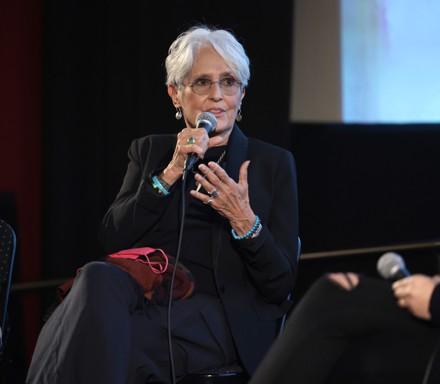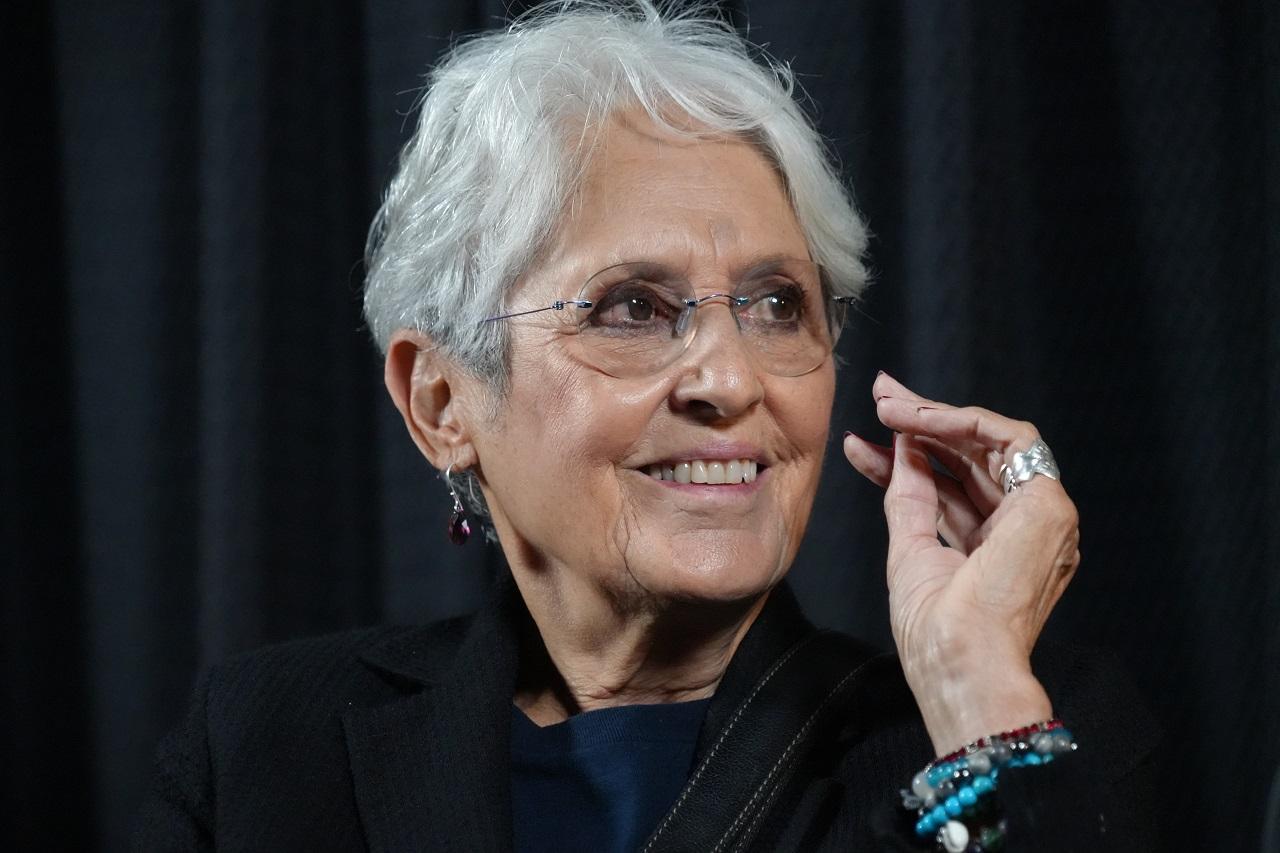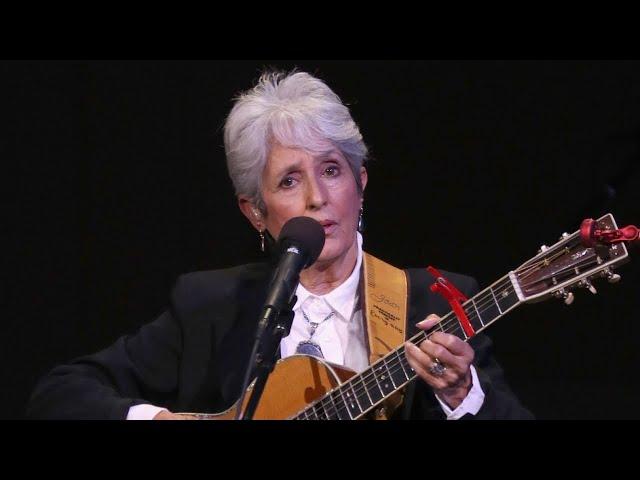In a moment that has now gone viral and become the talk of social media, Joan Baez, the 84-year-old folk legend, proved once again why she is regarded as one of the most iconic voices in music and activism. With just eight words — “I don’t care what you think of me” — Baez silenced host Karoline Leavitt during a live TV interview, transforming what was meant to be a high-pressure ambush into an unforgettable lesson in composure and control.

The stage was set for what should have been another routine media appearance. Baez, known for her advocacy for peace, social justice, and human rights, was invited to discuss her new project, a documentary chronicling her illustrious career and lasting impact. However, the interview quickly took an unexpected turn when Leavitt, a conservative political commentator, launched into a personal attack rather than a discussion of Baez’s artistic legacy.

The tense moment began innocuously enough, as Leavitt attempted to steer the conversation toward Baez’s political stances, challenging her on past statements and activism. But when the interview took a sharp turn into the hostile, Leavitt, visibly annoyed, let her true colors show. With a dismissive smirk and a roll of her eyes, she sarcastically labeled Baez “pathetic” and accused her of being “desperate for relevance.” The words were meant to provoke, to bait Baez into a defensive response. But what followed instead left viewers in stunned silence.

Baez, known for her poise and refusal to back down in the face of adversity, did not flinch. She didn’t raise her voice, didn’t lash out. Instead, with a calm yet steely tone, she uttered those eight words that would immediately silence her critics: “I don’t care what you think of me.”

In those few words, Baez not only quashed Leavitt’s attempt at undermining her, but she also delivered a masterclass in personal power, grace, and staying true to one’s convictions. It was a moment that exemplified the strength and wisdom that Baez has accumulated over decades of being in the public eye, especially as someone who has consistently used her platform to speak out for justice and equality.

Leavitt’s face, caught mid-smirk, shifted into a look of discomfort, clearly taken aback by Baez’s unshakable response. The silence in the room was palpable, and for a brief moment, the dynamic had shifted. The host, who had hoped to tear down one of the most enduring figures in American folk music, was left without words of her own, while Baez stood unwavering.
For those who have followed Baez’s career, the moment was far from surprising. Throughout her life, Baez has been a fearless advocate for the causes she believes in, often placing herself at the forefront of protests and political movements. Whether it was her involvement in the Civil Rights Movement, her opposition to the Vietnam War, or her vocal support for the LGBTQ+ community, Baez has never been one to shy away from speaking her truth, no matter the consequences.
But what made this particular moment so compelling was the way Baez handled the situation with such calm and dignity. She didn’t need to shout over Leavitt, didn’t need to retaliate with harsh words. Instead, she simply stood her ground and reminded everyone watching that she had nothing to prove to anyone — certainly not to someone trying to diminish her life’s work with cheap insults.
Baez’s response also speaks to a larger truth about the nature of celebrity and public life. In a world where people often feel the need to defend their actions, their careers, and their choices in the face of criticism, Baez’s calm defiance serves as a powerful reminder that one doesn’t always have to respond to every insult or attack. Sometimes, the most effective response is to simply refuse to engage in the game that others want you to play.
Her words also resonated with many viewers who saw in her a role model of integrity and self-respect. As a woman who has spent much of her life using her voice to stand up for the marginalized, the powerless, and the oppressed, Baez’s message in that moment transcended the boundaries of the interview itself. It was a reminder to anyone who has ever been unfairly criticized or undermined that they don’t have to let the opinions of others dictate their worth or their actions.
In the days following the interview, social media erupted in support of Baez. Thousands of fans and supporters flooded platforms like Twitter and Instagram, praising her for her poise and for taking down Leavitt with such elegance. Many noted how refreshing it was to see a figure like Baez, who has been in the public eye for decades, maintain such composure in the face of a hostile interview.
Some commentators also pointed out how this moment encapsulated the generational divide in media and politics. While Baez represents an older generation of artists and activists, Leavitt, who is known for her conservative political views, is part of a new wave of media personalities who often seek to challenge and provoke with inflammatory rhetoric. In this clash of ideologies, Baez’s composed response served as a subtle rebuke to the kind of discourse that thrives on division, insults, and personal attacks.
As for Leavitt, her attempt to undermine Baez backfired spectacularly. In the aftermath of the interview, many observers noted that Leavitt had lost the moral high ground by resorting to personal insults rather than engaging in a thoughtful, substantive discussion. Instead of winning the confrontation, she appeared petty and unprofessional, while Baez emerged from the ordeal with even more admiration from the public.
For Baez, this encounter is likely just another chapter in a long career of standing up for what she believes in, no matter the opposition. She has faced criticism, backlash, and even threats in the past, but she has always persevered, using her music and voice to speak truth to power. In this instance, her words — “I don’t care what you think of me” — were not just a defense of herself but also a quiet declaration of independence, of the freedom that comes with knowing who you are and remaining true to that, no matter the pressures of the world around you.
In a world filled with noise and vitriol, Joan Baez’s response was a breath of fresh air. It was a reminder that sometimes the strongest statement you can make is to simply stand your ground and refuse to let anyone shake your sense of self. In the end, Baez didn’t just silence Karoline Leavitt; she reminded us all of the power of composure, grace, and unwavering self-confidence.